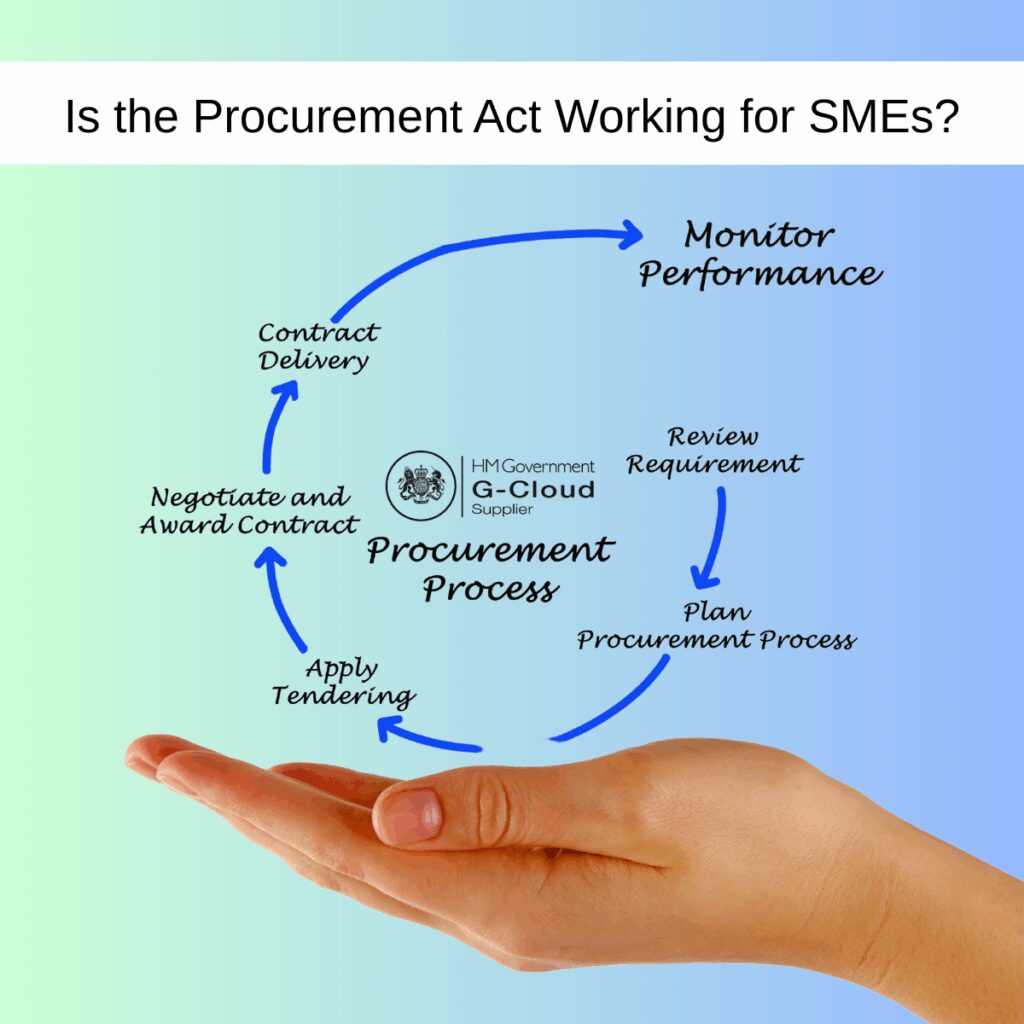The Procurement Act 2023 came into law on 24 February 2025, promising:
- “a simpler and more flexible, commercial system that better meets our country’s needs”
- To “open up public procurement to new entrants such as small businesses and social enterprises so that they can compete for and win more public contracts”
- “embed transparency throughout the commercial lifecycle so that the spending of taxpayers’ money can be properly scrutinised.”
In this blog we take the pulse of The Procurement Act and ask if the benefits promised are being delivered.
For a piece of legislation, it’s early days, but how do you think it is doing? We’d love to hear from you.
STONESEED’S VIEW
As a provider of IT Project Management resources via our Project Management as a Service, at Stoneseed, we are giving it an initial thumbs up.
We’ve been on G-Cloud for some time, and we’ve seen first hand the hurdles faced by public sector resourcing decision makers wanting to benefit from the more agile and cost-effective SME market.
Over the past few years, we’ve been a proud supplier to councils, charities, universities, and various public sector bodies, often engaging directly with procurement and HR teams via private procurement frameworks or Crown Commercial Service frameworks. Post Procurement Act, we feel even more visible to public sector buyers, and the process does feel more streamlined and better aligned with the full-market access enjoyed by the private sector.
THE SME DIFFERENCE
While large consultancies still play a central role in major programmes, SMEs are starting to make significant inroads thanks to The Procurement Act’s guidance that contracting authorities must consider SME-friendly approaches, such as breaking contracts into lots. This has allowed smaller firms to deliver value and impact in specific areas that add up to deliver greater gains.
In his article for techUK (The Hidden Power of SMEs in Public Sector Transformation), James Burdis writes, “The future of public service delivery depends on diverse, resilient ecosystems and SMEs are essential to that vision. By recognising SMEs as strategic partners rather than peripheral suppliers, public sector organisations can access a wider pool of innovation, expertise, and energy.”
James points to four SME advantages in public sector projects.
- Agility and Responsiveness
- Specialist Knowledge
- User-Centred Mindsets
- Culture of Innovation
I think he nails it, this is what we need to shout louder about to help deliver greater ROI for the taxpayer.
SMEs adapt more rapidly because of their streamlined structures and quicker decision-making processes. Stoneseed’s PMaaS model, for instance has flexibility baked in allowing project teams to respond swiftly to changing priorities.
SMEs lead innovation, Stoneseed was a pioneer of PMaaS, for example. We are well placed to test new ideas, refine approaches, embrace innovative methods, gather feedback and offer creative solutions. At Stoneseed we have always been focussed on better outcomes and end-user experience.
Stoneseed’s PMaaS gives you access to expertise on demand. Such depth of expertise enables precise, high-quality support to complement public sector transformations.
As well as experienced delivery professionals, PMaaS provides governance structures, and digital tools on demand. This approach gives the public sector access to scalable project oversight without the rigidity or cost of traditional consultancy models. helping to reduce risk, improve transparency, and maintain delivery momentum. Conclusion: Turning Policy Into Progress
The Procurement Act 2023 sets out a bold vision — one where transparency, flexibility, and open access help SMEs become a driving force in public service transformation. While we’re still in the early days, signs of progress are emerging.
FEEDBACK FROM “THE INSIDE”
I recently caught up with a Public Sector IT Project Manager friend, Andrew, his email gave me some idea of the work that still needs to be done to deliver the vision and spirit of the Act:
“Before the Act, the reality was that if I wanted to commission a company, I couldn’t just call the best people for the job. I couldn’t approach the brilliant local team who I knew could deliver exactly what was needed on time and on budget. They were not “on the system”, and if you were not on the system, you may as well not exist. Like trying to buy something from Argos that wasn’t in the catalogue.
I thought the new Procurement Act would change all of this and it slowly is. The big players still dominate the big contracts, but more of us are finding the confidence to try smaller suppliers and break projects into smaller chunks, and we are benefitting from it!”
It sounds like a new mindset, where procurement serves the taxpayer first and foremost, is gradually emerging. We are here for that – literally.
CONCLUSION: TURN POLICY INTO PROGRESS
At Stoneseed, we’re starting to feel the benefits too. As an SME providing IT project delivery through our PMaaS model, we’ve seen increased visibility, smoother procurement interactions, and a growing appetite for scalable, agile support across councils, charities, and universities.
But as our public sector colleague pointed out, there’s still a cultural shift needed. True value for money will come from embracing the innovation, flexibility, and specialist expertise that SMEs bring. That means trusting in smaller providers, breaking contracts into manageable lots, and using frameworks to unlock, not block, opportunity.
SMEs also have a role to play. We need to be more vocal, louder, clearer, and bolder in demonstrating the value we offer, not just in cost savings, but in better outcomes, faster delivery, and more responsive service design. We need to blow our trumpet louder!!
The government’s ambition for a third of procurement spend to go to SMEs remains just that – an ambition. With the proportion hovering around 20% for several years, it’s time for action. Local government has shown it’s possible, hitting 35%. Now others must follow.
The Procurement Act gives us the tools and a once in a generation opportunity.
It’s up to all of us, buyers, suppliers, stakeholders and partners, to turn that potential into impactful performance.
TRUMPET BLOW: A DELIVERY PARTNER ALREADY IN THE CATALOGUE
Managing IT project costs has never been more important. Stoneseed’s Project Management as a Service (PMaaS) gives you access to expert delivery professionals, governance structures, and digital tools — all on demand. No recruitment fees. No bench time.
When you want flexible, cost-effective delivery, we’re here to help … and yes … we’re already on the system.
More about Project Management as a Service from Stoneseed via Frameworks
Sources
https://www.legislation.gov.uk/ukpga/2023/54/contents/enacted
https://www.techuk.org/resource/the-hidden-power-of-smes-in-public-sector-transformation.html



